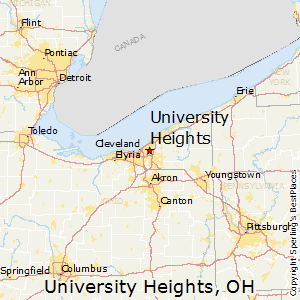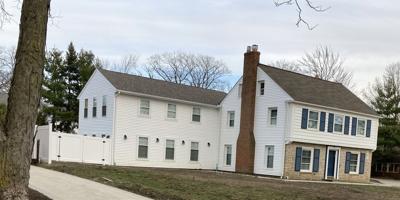Shortly after he sent out the invitation, Grand received a phone call from the mayor and a cease and desist letter from the city, regarding “2343 Miramar, University Heights, OH 44118, Planned Operation of Shul/Place of Religious Assembly.” When Grand spoke to Mayor Brennan, he was told that under Chapter 1274 of the University Heights Code, a special permit was required in order to host a religious gathering. Grand asked Mayor Brennan if ten Jewish individuals gathering would constitute a synagogue, to which Brennan replied “Yes it does, and if you do so in your home you will be in violation of [UHCO] Chapter 1274 for operating an illegal synagogue.” Grand decided he would get a permit in compliance with the city’s law, but after experiencing great backlash from the community, he dropped his application for a special permit and instead filed suit with the city, stating that it was unconstitutional to require such a permit.
According to Grand, it is a violation of his First Amendment right to free exercise of religion to enforce the permit requirement. By not allowing him and other members of his religious faith to pray in his home, Grand feels as if he is being singled out because he is Jewish and is not being able to carry out his religion as he desires. It is a requirement for individuals of his faith to pray three times daily, and on the Sabbath there must be a group of at least ten men for the prayer session. Traveling great distances on foot, especially in inclement weather, is a significant burden for Grand and members of his community, making prayer at his home the best option. Grand also feels as if he is being singled out because of his religion. Mayor Brennan stated that a group of ten individuals gathering constituted a synagogue, yet other members of the University Heights community are not held to the same standards. In practice, it appears as if the city has only enforced the requirement of permits for gatherings for members of the Orthodox Jewish community. Students from the local college routinely have gatherings at their homes, and other members of the community have large gatherings, all without permits or receiving cease and desist letters. This brings about the question, does University Height’s use of chapter 1274 to prohibit in-home prayer sessions violate the Orthodox Jewish community’s Free Exercise of religion?
I believe that there is a violation of Grand’s Free Exercise of religion. There is a significant burden placed upon Grand by forcing him to only be allowed to pray in a traditional synagogue setting. Men of the Orthodox Jewish faith must pray as a minyan three times each Saturday, which can be taxing as they are not permitted by their faith to drive to synagogue on this day. By praying in his home, Grand is able to avoid difficult travel each Shabbat and is given easier access to fulfilling his religious obligations. Additionally, Grand simply wanted to invite ten members of his religious community to pray at his private residence; he did not intend on creating a synagogue. These gatherings were only intended to take place on days which members of his faith are not permitted to drive, meaning that there would be no issue with parking or any flows of traffic in the neighborhood. Use of a permit under chapter 1274 is required for “houses of worship,” but this simply does not qualify as one. It is simply a gathering of ten Orthodox Jewish individuals, just trying to exercise their First Amendment right to Freedom of Religion.
I also question the neutrality of this case. It is one thing if every gathering of ten individuals required a special permit, yet this does not appear to be the practice. People in the community were able to have gatherings of any type, as large as they wanted, without consequence, yet this one prayer group was singled out. A group of ten Jewish men gathering for prayer should be held to the same standards as a secular gathering, otherwise the religious group is being discriminated against. Additionally, there is also an issue of neutrality among religions, as the only group that has been told to refrain from gathering was a group of Jewish individuals.
This case is important as it creates a slippery slope. If these ten Jewish men are not allowed to gather for prayer, does this mean that other Jewish people cannot gather to celebrate Passover seders or have Shabbat dinners without a permit? Does this mean that a bible study group is considered a church? Are people allowed to hold secular events with members of the same faith as themselves? I worry that if this case is ruled in favor of University Heights and Mayor Brennan, people will not feel safe practicing their religion in the comfort of their home and that other cities may see this as an opportunity to discriminate against certain religious groups.
https://www.clevelandjewishnews.com/news/local_news/university-heights-man-who-wanted-to-hold-prayer-group-in-home-sues-city-mayor/article_3edc4ad2-35e9-11ed-95f4-4f99ad56f756.html
https://ewscripps.brightspotcdn.com/8a/05/1051beb14e5da68f6fb7fd65a852/9007168712200178-grand-1594-ecf001-complaint.pdf



5 comments:
I think this case is a clear and obvious example of religious discrimination. Prayer is an act that can be done anywhere, by any group of people. But the insinuation that 10 jewish men in prayer constitutes a synagogue is rather egregious in nature. Your point that this would mean other jewish events where people come to gather would also therefore be illegal is a valid. This would mean every shabbat dinner with over 10 people, every Passover seder, and Rosh Hashanah celebration would be illegal. But what about 10 jewish simply gathered to eat that end up in prayer? Illegal as well. The state has no interest in this regulation and has created a very clear slippery slope situation. The sincerity of the Shabbat religious practice is clear--and a substantial burden is being placed on the Jewish men by prohibiting them from doing so.
You did a great job with this post, Marlee. I agree with both you and Amanda, in that there is a violation of Grand’s Free Exercise of religion. Furthermore, you discussed the question of neutrality in this case, and Amanda mentioned religious discrimination. I would argue that the city actually acted with religious hostility towards Grand, enforcing the use of a special permit, while not enforcing this permit use for other religious or non-religious groups.
I agree and I think this is certainly a violation of Grand's first amendment rights. I think that the question of neutrality is the most important here. If Grand can't have 10 Jewish men over, can 10 Catholic men not gather in a home either? I agree with the issue of this becoming a slippery slope. Can 10 people of the same religion not gather anywhere besides a place of worship? I also think that walking to and from synagogue 3 times in one day is a substantial burden, thus I do not think the permit should be required for Grand to have 10 people over.
I agree with you and how requiring access to a permit is a violation of Grand's first amendment rights. Is this statute created neutral in the creation and in practice? Prayer is allowed to be practiced anywhere, no matter the number of people. Would this even be up for discussion if this were dealing with another religion? This proposes a slippery slope because if they do not allow an individual of this religion to practice in their own space, then will they not allow individuals of a different religion to practice in their own space? Walking that much to attend a religious prayer 3 times a day is a substantial burden on the individual, but also not being allowed to practice their religion at all is a substantial burden on the individual.
Great job outlining the important facts of the case and relevant arguments! Upon reading the other comments, I agree with what Molly said regarding the city’s apparent religious hostility against Grand in this case, seen in the exemptions made for gatherings of other similar groups. However, I do see where the gathering of the 10 men could be considered to be a violation of the statue, if they are using this space to be a replacement for going to the synagogue, likely completing similar prayers to what would have occurred if they had traveled there. Rather, I think looking at the content of the gathering is more important in this matter than the quantity of people there, allowing celebrations like Passover, Shabbat dinners, etc. to occur within the home as they aren’t events that would have naturally occurred in a synagogue otherwise. However, I also recognize the slippery slope of allowing government regulation of religion within the private sphere.
Post a Comment